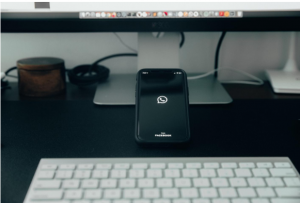Setting up WhatsApp Calling
WhatsApp has become one of the most popular messaging apps worldwide, and it now offers a convenient feature that allows users to make phone calls directly through the app. To take advantage of this feature, you need to set up WhatsApp calling on your device. Here’s how you can do it:
1. Install or Update WhatsApp: Firstly, make sure you have the latest version of WhatsApp installed on your smartphone. If not, update it from your device’s app store.
2. Grant Permissions: After installing or updating WhatsApp, launch the app and grant the necessary permissions, such as access to your contacts and microphone. These permissions are essential for making and receiving calls through the app.
3. Verify Phone Number: WhatsApp requires verification of your phone number to ensure security. Enter your phone number and wait for the verification code. Once you receive it, enter the code in the app to complete the verification process.
4. Access Preferences: Open the WhatsApp settings menu by tapping on the three-dot icon in the top-right corner of the app’s main screen. From here, select “Settings” to access the preferences.
5. Enable WhatsApp Calling: In the settings menu, select “Calls” and then enable the “WhatsApp Calls” option. Once enabled, WhatsApp calling will be activated on your device.
6. Test the Feature: To confirm that WhatsApp calling is working correctly, you can try making a test call to one of your contacts who have WhatsApp installed. Simply open a chat with the contact, tap on the phone icon at the top-right corner, and choose “Voice Call.”
That’s it! You have successfully set up WhatsApp calling on your device. Now, enjoy making voice calls to your friends and family through the app without any additional charges, as long as you have an internet connection.
Making a WhatsApp Phone Call
Making a phone call through WhatsApp is a seamless and hassle-free process. Here’s how you can make a WhatsApp phone call:
1. Open WhatsApp: Launch the WhatsApp application on your smartphone. Ensure that you are connected to the internet, either through Wi-Fi or mobile data.
2. Select a Contact: Choose the contact you wish to call from your WhatsApp contacts list. You can either scroll through the list or use the search bar for quicker access.
3. Initiate the Call: Once you have selected a contact, tap on their name to open the chat window. At the top-right corner of the chat screen, you will find a phone icon. Tap on it to initiate a WhatsApp call.
4. Choose Call Type: WhatsApp offers two call types: voice call and video call. After tapping the phone icon, a menu will appear asking you to select the type of call you want to make. Choose “Voice Call” if you want to make an audio-only call.
5. Wait for Connection: Once you have selected the call type, WhatsApp will attempt to connect the call to the contact. Depending on the network strength and the availability of the recipient, there may be a brief waiting time before the call connects. Be patient during this process.
6. Enjoy the Conversation: Once the call is connected, you can have a conversation with the recipient just like you would with a regular phone call. You can speak directly into your device’s microphone, and the recipient’s voice will come through the device’s speaker.
7. Additional Options: During the call, WhatsApp offers some additional features. For example, you can switch to speakerphone mode by tapping the speaker icon, mute your microphone by tapping the microphone icon, or use the chat icon to send text messages without disconnecting the call.
That’s it! You now know how to make a WhatsApp phone call. Whether it’s a quick catch-up or a lengthy conversation, WhatsApp calling allows you to stay connected with your loved ones around the globe, all without incurring any additional charges, as long as you have an internet connection.
Using Voice Over Internet Protocol (VoIP) for WhatsApp Calls
WhatsApp calls operate based on Voice over Internet Protocol (VoIP) technology, which allows you to make phone calls using an internet connection instead of traditional telephone lines. Here’s what you need to know about using VoIP for WhatsApp calls:
1. Internet Connection: To make WhatsApp calls, you must have a stable internet connection. Connecting via Wi-Fi is recommended for the best call quality, but you can also use mobile data if Wi-Fi is not available.
2. Data Usage: VoIP calls consume data from your internet plan or Wi-Fi connection. It is important to monitor your data usage, especially if you have a limited data plan. WhatsApp provides an option to manage call settings and reduce data usage, which we’ll explore later in this guide.
3. International Calling: One of the significant benefits of using WhatsApp for calling is the ability to make international calls at no additional cost, as long as you have an internet connection. This makes it a cost-effective option for connecting with friends and family abroad.
4. Call Quality: The call quality on WhatsApp can vary depending on the strength and stability of your internet connection. Factors such as network congestion, signal strength, and data speed can impact call quality. It’s recommended to use a strong and stable internet connection for the best call experience.
5. Cross-Platform Compatibility: WhatsApp calling is available on both Android and iOS devices, making it convenient for users regardless of their device preferences. You can make WhatsApp calls between different platforms without any compatibility issues.
6. End-to-End Encryption: WhatsApp ensures the privacy and security of your calls through end-to-end encryption. This means that your calls are secured and cannot be intercepted or accessed by third parties. The encryption ensures that only you and the recipient can listen to the conversation.
VoIP technology enables seamless and affordable communication through WhatsApp calls. By utilizing an internet connection, you can connect with people anywhere in the world without the need for traditional telephone networks or incurring additional charges.
Troubleshooting WhatsApp Calling Issues
While WhatsApp calling is generally reliable, you may encounter occasional issues that can affect the quality of your calls. Here are some common troubleshooting steps to resolve WhatsApp calling problems:
1. Check Internet Connection: Ensure that you have a stable and strong internet connection. Disconnect and reconnect to Wi-Fi, or switch to a different network if possible. If using mobile data, ensure that you have a good signal and sufficient data balance.
2. Restart WhatsApp: Sometimes, simply restarting the WhatsApp application can resolve minor glitches. Close the app completely, then reopen it to see if the issue persists.
3. Restart Your Device: If restarting WhatsApp didn’t solve the problem, try restarting your device. This can help clear any temporary issues that might be affecting WhatsApp calling.
4. Update WhatsApp: Ensure that you have the latest version of WhatsApp installed on your device. Outdated versions may have bugs or compatibility issues that can interfere with calling functionality. Update WhatsApp from your app store if needed.
5. Check App Permissions: Verify that WhatsApp has the necessary permissions to access your device’s microphone and contacts. Go to your device’s settings, find the WhatsApp app, and make sure all required permissions are enabled.
6. Clear App Cache: Clearing the cache of the WhatsApp app can help resolve certain performance issues. Go to your device’s settings, find the WhatsApp app, and clear its cache. Be mindful that this will delete temporary files, but it won’t delete any chats or media.
7. Disable VPN or Proxy: If you are using a VPN (virtual private network) or proxy on your device, try disabling it temporarily. VPNs or proxies can sometimes interfere with WhatsApp calling functionality.
8. Contact WhatsApp Support: If the above steps do not resolve the issue, you can reach out to WhatsApp support for further assistance. They may provide specific troubleshooting steps based on the nature of your problem.
By following these troubleshooting steps, you should be able to address most WhatsApp calling issues. Remember, a stable internet connection is crucial for uninterrupted calling, so always prioritize a reliable network before making WhatsApp calls.
Managing WhatsApp Call Settings
WhatsApp provides several options to customize and manage your call settings according to your preferences. Here are the key settings you can adjust:
1. Notifications: You can control how WhatsApp notifies you about incoming calls. Open the WhatsApp settings menu and go to “Notifications.” From here, you can choose the type of notification, such as sound, vibration, or silent mode, and set different options for individual and group calls.
2. Ringtone: Customize the ringtone for WhatsApp calls to easily recognize when you receive a call. Under the “Notifications” settings, select “Call ringtone” to choose from the available options or set a custom ringtone from your device’s storage.
3. Default Call Type: WhatsApp offers the flexibility to choose the default call type between voice and video calls. You can select your preference under the “Calls” section in the WhatsApp settings menu. This will automatically initiate the chosen call type when you make a call without selecting it every time.
4. Low Data Usage: If you want to conserve data while making WhatsApp calls, enable the “Low Data Usage” option. This feature minimizes the amount of data used during calls without compromising the call quality significantly. This setting can be found in the “Data and Storage Usage” section of the WhatsApp settings menu.
5. Call Logs: WhatsApp keeps a record of your call history within the app. You can access this log to see details of incoming, outgoing, and missed calls. From the main screen, navigate to the “Calls” tab to view your call history.
6. Blocked Contacts: WhatsApp allows you to block certain contacts from calling you. To block a contact, open the chat screen with the contact, tap on the menu icon (three dots), and select “Block.” This will prevent the contact from making WhatsApp calls or sending messages to you.
7. Privacy Settings: WhatsApp offers privacy settings that let you customize who can call you on the app. You can choose to allow calls from everyone, only your contacts, or specific contacts. Access these settings by going to “Account” in the WhatsApp settings menu and selecting “Privacy.”
These call settings give you control over your WhatsApp calling experience and allow you to customize various aspects according to your preferences. Explore these options and adjust them to create a personalized calling experience on WhatsApp.
Tips and Tricks for Better WhatsApp Call Quality
Having clear and uninterrupted calls on WhatsApp enhances your overall communication experience. Here are some tips and tricks to improve the quality of your WhatsApp calls:
1. Stable Internet Connection: A strong and stable internet connection is crucial for high-quality WhatsApp calls. Whenever possible, connect to a reliable Wi-Fi network for the best call quality. If using mobile data, ensure you have a good signal strength.
2. Minimize Background Noise: Find a quiet environment for making WhatsApp calls to reduce background noise. Background noise can distort your voice and make it harder for the other person to hear you clearly.
3. Use Headphones: Using headphones or earphones with a built-in microphone can help improve call quality. They minimize background noise and enhance audio clarity, allowing you to hear and be heard more clearly during the call.
4. Maintain a Good Signal: If you experience poor call quality during a WhatsApp call, ensure that you have a stable network signal. Move to an area with better network coverage or switch to a different network (Wi-Fi or mobile data) for better signal strength.
5. Close Unnecessary Apps: Close any unnecessary apps running in the background during WhatsApp calls. Other active apps can consume system resources and impact the performance of the call, leading to lower voice quality or even call drops.
6. Update WhatsApp: Keep your WhatsApp application up to date with the latest version. Updates often include bug fixes and performance improvements, which can enhance the overall call quality and stability of the app.
7. Restart Your Device: If you are experiencing persistent issues with call quality, try restarting your device. This can help clear any temporary glitches or software conflicts that might be affecting WhatsApp calls.
8. Check Audio Settings: Ensure that your device’s microphone and speaker are working correctly. Test them with other apps or make a regular phone call to verify audio quality. If there are issues, check your device’s settings or consult the device manufacturer for troubleshooting steps.
By following these tips and tricks, you can enhance the quality of your WhatsApp calls and enjoy clear and uninterrupted conversations with your contacts.
Security and Privacy Considerations for WhatsApp Phone Calls
When using WhatsApp for phone calls, it’s important to be aware of the security and privacy features that the app provides. Here are some key considerations to keep in mind:
1. End-to-End Encryption: WhatsApp implements end-to-end encryption for all calls, which means that the content of your calls is encrypted and can only be accessed by you and the recipient. This encryption ensures that your calls are secure and protected from unauthorized access.
2. No Call Recording: WhatsApp does not have a built-in call recording feature. This ensures that your conversations remain private and cannot be recorded by the app itself. However, it’s essential to be cautious about any third-party apps that claim to offer call recording functionality, as they may compromise your privacy.
3. Authorized Contacts Only: You can only make WhatsApp calls to contacts who have WhatsApp installed and have your contact information saved. This limits the risk of receiving unwanted calls from unknown or unauthorized individuals.
4. Blocking and Reporting: WhatsApp provides options to block and report abusive or unwanted callers. If you receive harassing or unsolicited calls, you can block the contact or report them to WhatsApp. This helps in maintaining a safe and secure calling experience.
5. Authentication Methods: WhatsApp implements various authentication methods to ensure that the person you are communicating with is indeed the intended contact. These methods include verifying phone numbers and using security codes during the initial setup process.
6. Limit Personal Information Sharing: Be cautious about sharing personal information during WhatsApp calls, especially with unknown or unverified contacts. Exercise discretion and avoid sharing any sensitive information that could compromise your privacy or security.
7. Network Security: Keep in mind that WhatsApp calls rely on your internet connection, whether it’s Wi-Fi or mobile data. Ensure that you are connected to a secured network when making calls to minimize the risk of unauthorized access or interception of your calls.
By being aware of these security and privacy considerations, you can use WhatsApp phone calls with confidence, knowing that your conversations are protected and your privacy is respected. As with any communication platform, it’s important to exercise caution and use common sense when engaging in conversations with others.
Exploring Other Features of WhatsApp Calling
WhatsApp calling offers more than just the ability to make audio and video calls. Here are some additional features and functionalities that you can explore:
1. Group Calling: WhatsApp allows you to make group calls with multiple participants. You can add up to four people (including yourself) to a group call, making it a convenient option for group discussions or catching up with friends and family.
2. Call Waiting: If you receive a WhatsApp call while already on another call, the app provides a call waiting feature. You will see an option to accept or decline the incoming call while keeping your existing call in progress.
3. Forwarding Calls: WhatsApp allows you to forward incoming calls to another contact if you are unable to answer them yourself. This feature can be useful if you want someone else to take the call or if you are temporarily unavailable.
4. Picture-in-Picture Mode (PiP): While on a video call, you can use the Picture-in-Picture mode to continue your call while simultaneously accessing other apps on your device. This feature enables multitasking during video calls, making it convenient for various purposes.
5. Voice Messages: If you are unable to make a call, you can still communicate through voice messages on WhatsApp. Simply hold down the microphone icon in a chat and record your voice message. This way, you can send voice snippets without having to make a full-fledged call.
6. Status Updates: WhatsApp’s status feature allows you to share temporary updates, including photos, videos, or text. You can use this feature to let your contacts know if you are available for calling or if you want to update them on your current status.
7. Live Location Sharing: In addition to calling, you can share your live location with contacts on WhatsApp. This feature can be useful if you want to let someone know where you are or if you are meeting someone at a specific location.
These additional features of WhatsApp calling enhance the overall communication experience. Take some time to explore them and make the most of WhatsApp’s versatile calling capabilities.



